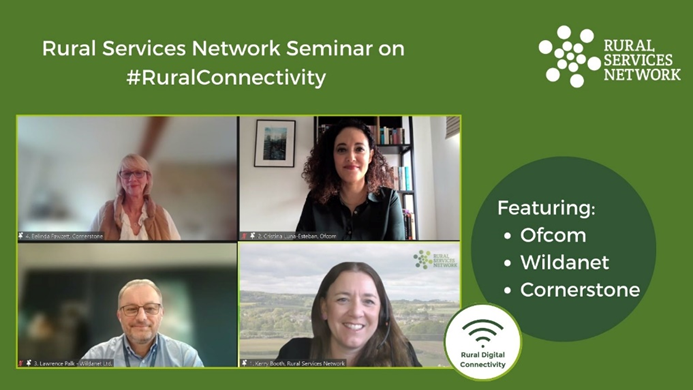T: 01822 851370 E: [email protected]
Visit RSN Survey about life in rural England to find out more.
Rural Connectivity Seminar: Navigating the Path to Digital Inclusion
Last week, RSN members joined us for our Rural Connectivity Seminar. This exclusive event served as a forum for discussions, presentations, and Q&A sessions, focusing on the crucial topic of enhancing digital connectivity in rural areas.
The seminar featured three speakers who shared their expertise on significant aspects of rural connectivity.

Cristina Luna-Esteban, Policy Director at OFCOM, delved into the intricate process of the UK's digital switchover, focusing on the transition from the Public Switched Telephone Network (PSTN) to Voice over Internet Protocol (VoIP) and the phasing out of 2G and 3G networks. Her presentation pointed out Ofcom's commitment to consumer protection, highlighting the importance of ensuring uninterrupted access to emergency services and supporting vulnerable groups through this transition. The collaborative efforts between local authorities, telecom providers, and telecare stakeholders were emphasised as vital to overcoming the challenges faced by rural communities during this digital evolution.
Lawrence Palk, representing Wildanet as the Director of B2B Sales & GTM Strategy, presented a compelling vision for preventing digital exclusion in rural areas. He outlined the dire need for gigabit-capable broadband to avert the economic, social, and environmental disadvantages that come with inadequate connectivity. By proposing a hybrid solution of Full Fibre and Wireless technologies, Wildanet aims to foster economic growth and bridge the digital divide, thereby ensuring that rural communities are not left behind in our increasingly digital world.
Belinda Fawcett, General Counsel & Director of Property & Estates at Cornerstone, shared insights into the Shared Rural Network (SRN) program. Her presentation focused on the concerted efforts to extend digital connectivity to remote areas, highlighting the construction of 450 sites designed to bring millions within the reach of reliable coverage. She addressed the challenges of site development and the critical role of local community and authority collaboration in this endeavour. The discussion also covered the broader benefits of improved connectivity, such as enhanced public safety, economic growth, and support for environmental monitoring.
The seminar was not without its moments of heated debate, as participants expressed their frustrations and concerns about the current state of rural connectivity. However, these discussions also paved the way for constructive proposals on overcoming these challenges, reflecting a shared commitment to digital inclusion.
The Rural Services Network provides a range of meetings and events for organisations within membership to attend depending on their area of interest. Details on our future events can be found here.



